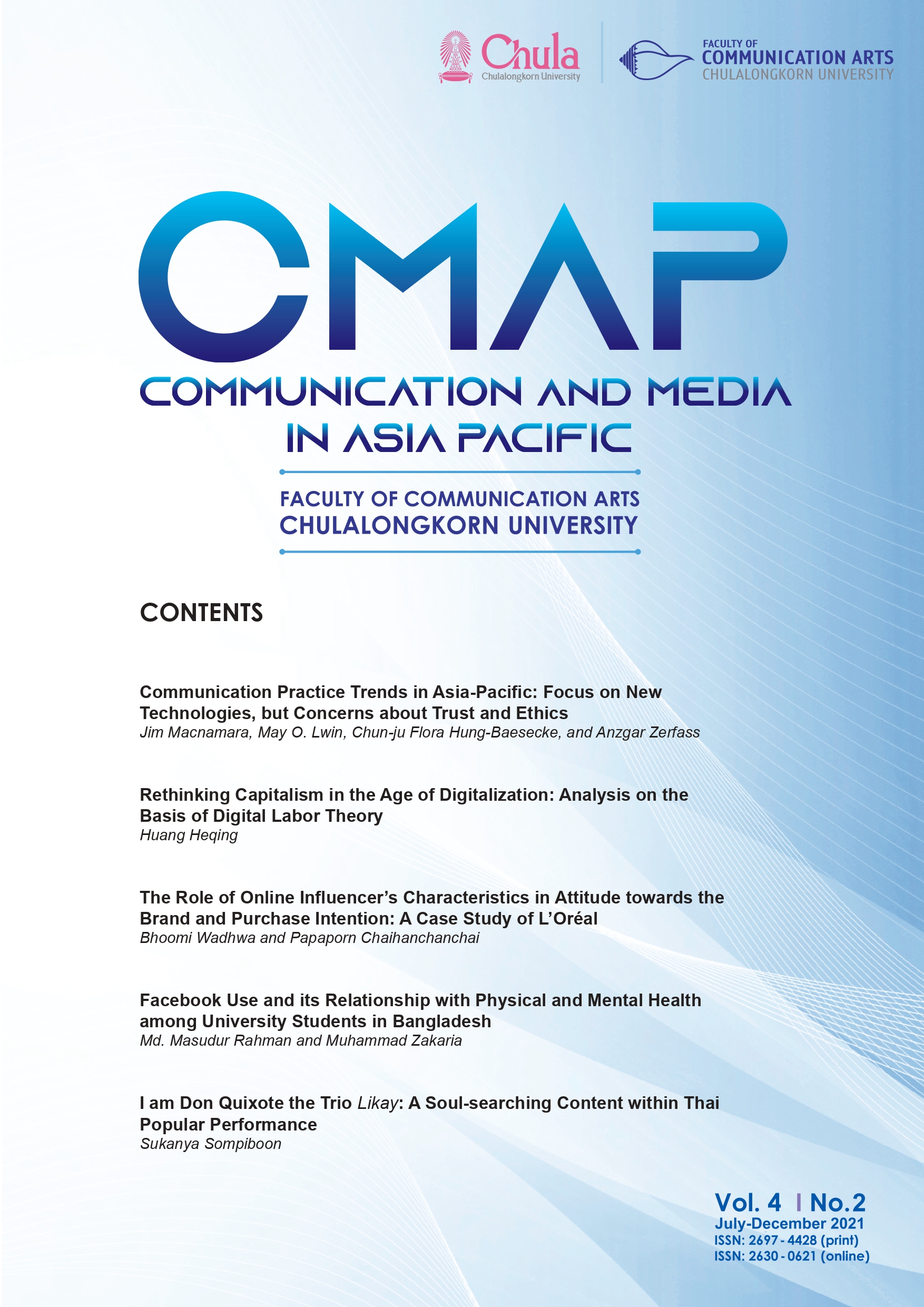Facebook Use and its Relationship with Physical and Mental Health among University Students in Bangladesh
Main Article Content
Abstract
Facebook addiction causes different health-related problems like insomnia, loneliness, frustration, headache, wrist pain, eye pain, blurred eyes, and laziness. This study aims to assess the effects of Facebook use on the students’ physical and mental health at the University of Chittagong, Bangladesh. An institution-based cross-sectional study was conducted among the students (N = 385) of 21 departments from seven faculties of the university. Data were collected using a structured and self-administered questionnaire. Descriptive statistics and chi-square (χ2) analyses were performed. This study revealed that more than half of the students (54.8%) use Facebook on average for more than two hours daily. Other findings include: 49.9% of students became angry when interrupted in using Facebook, 55.1% had a headache problem, 62.1% of them have an eye pain problem, 50.0% of respondents suffered from blurred eyes, 50.1% users had insomnia problems, and they could not wake up early in the morning. Most of them reported that sometimes mealtime passed while using Facebook, and they became excited when they see something unexpected content on Facebook. Moreover, the respondents who used Facebook for more than two hours were more likely (p < .05) to suffer from different physical and mental health problems. In addition, the students whose parents were living in the urban area, parents’ higher educational qualifications, and the respondents who read newspapers irregularly had a higher likelihood of using Facebook for more than two hours daily. This study suggests increasing awareness regarding the connection between health effects and social media use among university students.
Article Details
References
Akter, R., & Islam, M. M. (2015). Does Facebooking help or hamper university students’ wellbeing? The Chittagong University Journal of Business Administration, 27, 187-204.
Al-Dubai, S. A. R., Ganasegeran, K., Al-Shagga, M. A. M., Yadav, H., & Arokiasamy, J. T. (2013). Adverse health effects and unhealthy behaviors among medical students using Facebook. The Scientific World Journal, 2013(465161), 1-5.
Andreassen, C. S., Torsheim, T., Brunborg, G. S., & Pallesen, S. (2012). Development of a Facebook addiction scale. Psychological reports, 110(2), 501-517.
Bangladesh Telecommunication Regulatory Commission (BTRC). (2017). Annual Report 2016-2017. Retrieved from: http://www.btrc.gov.bd/annual-report
Chavez, G. B., & Chavez Jr, F. C. (2017). Relationship between Facebook addiction and loneliness of Filipino high school students. Liceo Journal of Higher Education Research, 13(1), 50-60.
Ellison, N. B., Steinfield, C., & Lampe, C. (2007). The benefits of Facebook “friends:” Social capital and college students’ use of online social network sites. Journal of Computer‐Mediated Communication, 12(4), 1143-1168.
Farooqi, H., Patel, H., Aslam, H. M., Ansari, I. Q., Khan, M., Iqbal, N., ... & Asad, N. (2013). Effect of Facebook on the life of medical university students. International Archives of Medicine, 6(1), 1-8.
Fernández-Villa, T., Ojeda, J. A., Gómez, A. A., CARRAL, J., CANCELA, M., Delgado-Rodríguez, M., ... & Martín, V. (2015). Problematic internet use in university students: Associated factors and differences of gender. Adicciones, 27(4), 265-275.
Gafni, R., & Deri, M. (2012). Costs and benefits of Facebook for undergraduate students. Interdisciplinary Journal of Information, Knowledge, and Management, 7(1), 45-61.
Goodyear, V., Armour, K., & Wood, H. (2018). The impact of social media on young people’s health and wellbeing: Evidence, guidelines and actions. Retrieved from http://epapers.bham.ac.uk/3070/1/The_Impact_of_Social_Media_on_Young_People%E2%80%99s_Health_and_Wellbeing_(FINAL_15TH_JAN).pdf
Junco, R. (2012). Too much face and not enough books: The relationship between multiple indices of Facebook use and academic performance. Computers in Human Behavior, 28(1), 187-198.
Kalpidou, M., Costin, D., & Morris, J. (2011). The relationship between Facebook and the well-being of undergraduate college students. Cyberpsychology, Behavior, and Social Networking, 14(4), 183-189.
Katz, E., Blumler, J. G., & Gurevitch, M. (1973). Uses and gratifications research. The Public Opinion Quarterly, 37(4), 509-523.
Kaur, R., & Bashir, H. (2015). Impact of social media on mental health of adolescents. International Journal of Education, 5, 22-29.
Kawsar, N. (2017). A survey on social media use, engagement and addiction as predictors of academic performance (Unpublished doctoral dissertation). East West University, Bangladesh.
Khoshakhlagh, H., & Faramarzi, S. (2012). The relationship of emotional intelligence and mental disorders with internet addiction in internet users university students. Addiction and Health, 4(3-4), 133-141.
Koc, M., & Gulyagci, S. (2013). Facebook addiction among Turkish college students: The role of psychological health, demographic, and usage characteristics. Cyberpsychology, Behavior, and Social Networking, 16(4), 279-284.
Kuss, D. J., & Griffiths, M. D. (2011). Online social networking and addiction--A review of the psychological literature. International Journal of Environmental Research and Public Health, 8(9), 3528-3552.
Littlejohn, S. W., & Foss, K., A. (2008). Theories of human communication (9th ed.). Boston, MA: Wadsworth.
MPh, M. M. (2015). Facebook addiction and its relationship with mental health among Thai high school students. Journal of Medical Association of Thailand, 98(3), S81-S90.
Masthi, N. R., Cadabam, S., & Sonakshi, S. (2015). Facebook addiction among health university students in Bengaluru. International Journal of Health & Allied Sciences, 4(1), 18-22.
Rohilla, P, S., & Kumar, K. (2015). Impact of social media on mental health. International Journal of Education, 5, 142-149.
Strickland, A. (2014). Exploring the effects of social media use on the mental health of young adults (Unpublished master’s thesis). University of Central Florida, USA.
Soron, T. R. (2015). Successful management of Facebook addiction in Bangladesh: A case report. Journal of Psychiatry, 18(2), 1-3.
Weiser, E. B. (2001). The functions of Internet use and their social and psychological consequences. Cyberpsychology & Behavior, 4(6), 723-743.


